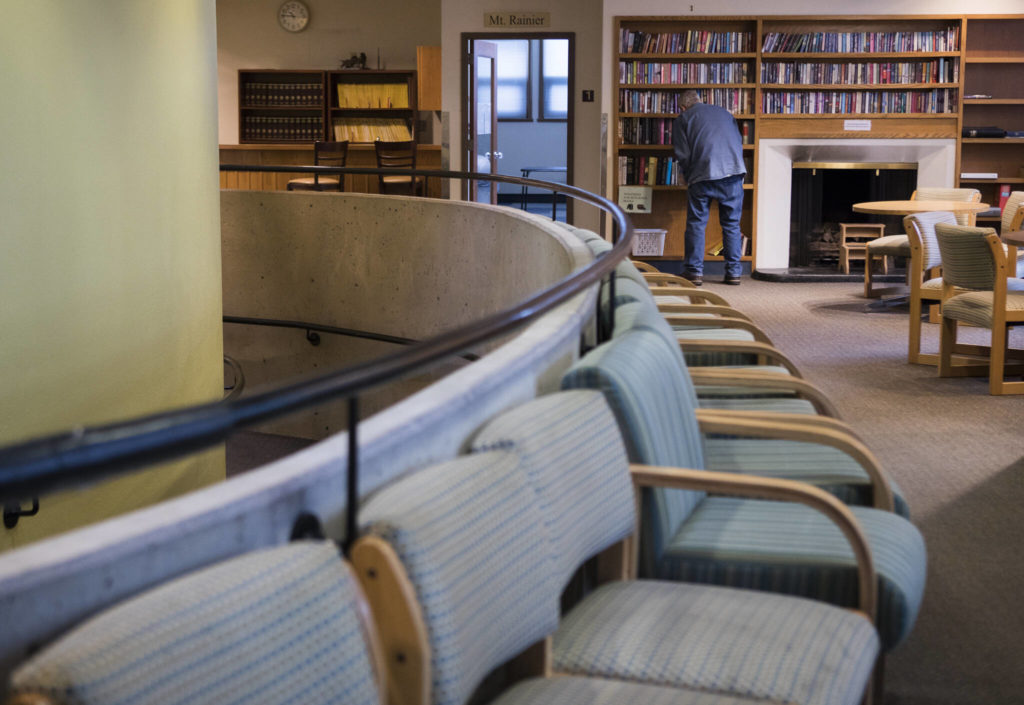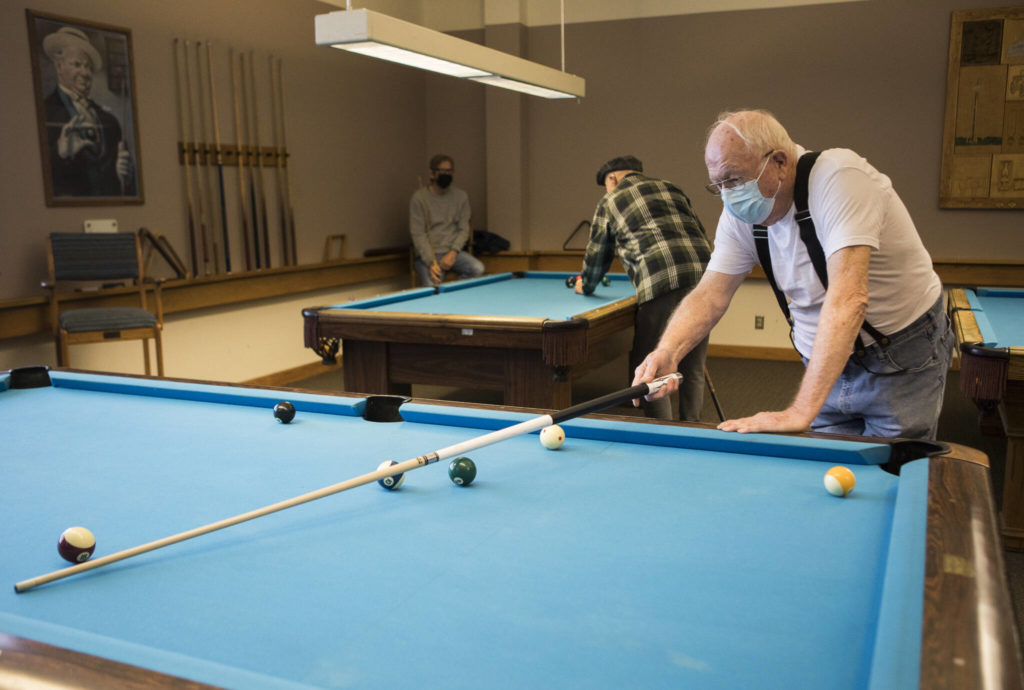EVERETT — Billiard balls rolled, bridge boards were dealt and ping-pong balls clacked Wednesday morning on opposite ends of the Carl Gipson Center.
It was the daytime center’s third day open after the city closed it in March 2020 because of the COVID-19 pandemic. About 50 people filtered in for billiards, bridge, exercise or to solve a crossword by the 11:30 a.m. lunch, provided by Homage Senior Services.
Monty Futch, of Everett, joined the then-city run Carl Gipson Senior Center in 2011 so he could play in the weekly bridge games.
“It’s the only thing that got me here,” he said, stacking cards into the bridge boards. “Every Tuesday was bridge. It was sacrosanct.”
Everett’s parks and recreation department used to operate the senior center at 3025 Lombard Ave. But the pandemic prompted city leaders to end the programs and shutter the building, aside from the take-home lunch service that continued through the pandemic.
It remained closed while other activities resumed.
Now, under a 14-year agreement with the city, Volunteers of America of Western Washington manages the facility and programs for older adults. They dropped “Senior” from the center’s name and lowered the age requirement to 50.
“We’re not here to dramatically change things,” said Cory Armstrong-Hoss, Volunteers of America of Western Washington’s director for the center.
About 40 people had signed up for memberships so far. Armstrong-Hoss said the center’s six staff have a goal of over 200 memberships by the end of January and over 500 at year’s end.
It’s all subject to the fluctuations of public health in the time of COVID.
“My guess is omicron is making people wary of coming back,” Futch said.
The Carl Gipson Center reopened to in-person gatherings just as COVID cases surged to record highs, causing hospitals to restrict procedures and visits.
Senior centers in Arlington, Darrington, Granite Falls, Monroe, Snohomish, and Tulalip have resumed in-person lunch again, Homage Senior Services spokesperson Hazel Borden said.
All senior centers in the county, except Lincoln Hill Community Center in Stanwood, have resumed in-person activities with COVID-19 precautions, Snohomish County staff said. Lincoln Hill still has a drop-off and pick-up operation for meals, food bank supplies and medical equipment loans.
Homage plans to reopen the Center for Healthy Living, also called the Multicultural Senior Center, at 5026 196th St. SW in Lynnwood by February or March.
“Older adults are already so isolated, and these senior centers have been that space for them to come together and build communities,” Borden said. “To not have that the past two years has been very lonely.”
People 65 and up remain the population most-hospitalized by COVID, even as recent case counts are dominated by people between 12 and 49 years old, according to Washington State Department of Health data.
Volunteers of America (VOA) requires guests to provide proof of vaccination or an approved medical or religious exemption. Masks are required by guests with the only exception during eating and drinking.
Armstrong-Hoss said the rules could keep some people away but bolsters safety for its members, staff and volunteers.
“That’s the right way to go to start,” he said.
Armstrong-Hoss hopes lowering the age requirement for membership expands the center’s reach.
“There’s a whole population who don’t ever see themselves going to a senior center,” Armstrong-Hoss said. “They want trips, they want things that are not for ‘the elderly.’”
A broader client base could boost the small revenue that comes from annual membership fees. Armstrong-Hoss also hopes it leads to more event rental for its rooms — a possible new revenue source.
Outside groups can rent a room or the kitchen and dining hall, which can be separated by an accordion wall for the stage space and dining area. Rates range between $50 and $120 and start at two hours.
When Everett ran the senior center it charged $30 for annual memberships, plus other fees for certain classes or programs.
VOA’s annual membership costs $25 and financial assistance is available. Armstrong-Hoss said the goal is to have it include a parking permit and programs such as exercise equipment, fitness classes, table tennis and Wii bowling and golf.
Other things such as field trips may have fees, but those were not yet set.
Memberships are free through January as the VOA reopens the center and tries to bring back people who haven’t been there in almost two years.
In the year before the closure Everett had 1,100 paid memberships and averaged about 200 people per day, city spokesperson Kimberley Cline said.
Per the agreement, the city will pay the VOA monthly through 2027 to run the center. Everett’s set to pay $37,500 monthly this year. The amount decreases each year, until 2028, when the city is no longer financially obligated.
That gives the Volunteers of America (VOA) time to establish its operating revenue through memberships, fees and fundraising.
Between 80 and 100 volunteers used to help at the center when the city ran it. Armstrong-Hoss is hopeful for similar numbers and is seeking volunteers.
Everett approves the VOA’s annual service plan for the center. It’s named in honor of the city’s first Black councilman, who died Oct. 8, 2019.
The city still owns the building and property, and covers maintenance including carpet, doors, electrical, the elevator, HVAC, paint and roof. The building was constructed in 1978.
People like Futch, the bridge director, and fellow bridge enthusiast George Beykovsky are locks to keep coming, as long as there’s bridge to be played.
Years ago Beykovsky started going to the center to play the card game after a neighbor at his condo invited him. Before the pandemic, Beykovsky said he played three times a week.
On Wednesday, he stood outside the bridge room sipping coffee and greeting old friends. Of the roughly dozen players, he knew all but three before then.
Across the building, a trio of men lined up their shots on a pool table. While the center was closed they had played at a nearby social club, but said the table there wasn’t as nice.
“I just started coming in, got to know a few people and kept coming back,” said Jim Thayer watching two friends play a game.
Thayer doesn’t keep track of who wins or loses.
Nearby in the Mount Baker and Mount St. Helens rooms, two groups played table tennis. Points were scored in seconds as the ball zipped across the net. Cheers and laughter erupted as they called out their scores.
Ben Watanabe: bwatanabe@heraldnet.com;
Correction: This story has been modified to correct the address for the Center for Healthy Living.
Talk to us
> Give us your news tips.
> Send us a letter to the editor.
> More Herald contact information.
































